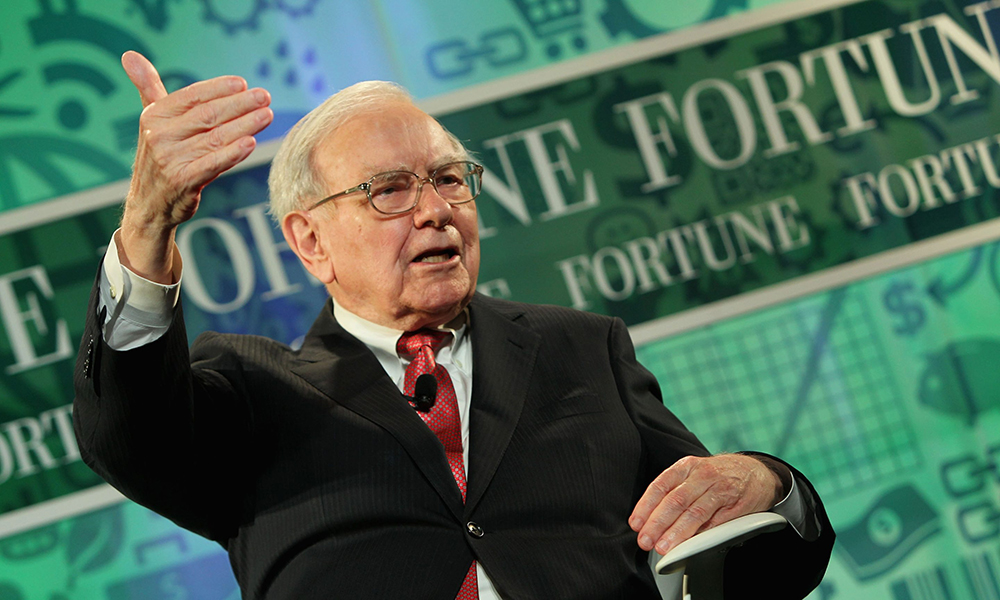
伯克希尔-哈撒韦公司(Berkshire Hathaway)的首席执行官沃伦·巴菲特在今年2月24日通过年度致股东的信,对已故的挚友和左膀右臂查理·芒格,发表了一段感人的颂词。“奥马哈先知”巴菲特称赞芒格是伯克希尔-哈撒韦成功的“建筑师”,他赞美了这位“爱唱反调的讨厌鬼”,讨论了一些他最喜欢批判的话题,包括将现代股市比喻成赌场。
巴菲特写道:“不管出于什么原因,现在的股市比我年轻时更像赌场。”他补充道:“虽然股票市场比我们早年的规模更大,但今天活跃的市场参与者与我上学时相比,既没有情绪更稳定,也没有受过更好的教育。”
巴菲特的警告之词显然回顾了芒格最爱说的话。芒格在超过75年的职业生涯中,曾经表示有两类人会在股票市场中购买股票,分别是投资者和投机者。投资者在购买资产时有规矩,非常努力,而且思维缜密,芒格总是喜欢这类人。但投机者只想赚快钱,不考虑他们所购买的股票的固有价值,芒格厌恶这类人。
他在2022年4月接受伯克希尔-哈撒韦的投资官托德·库姆斯采访时说:“他们喜欢赌博,但问题是这就像吸食海洛因一样。有一部分人最开始的做法就很过火。这是一种令人上瘾的做法。这非常疯狂,会令人发疯。如果没有这种投机,人类文明本应变得更加美好。”
与芒格一样,巴菲特担心太多的现代投资者痴迷于投机性投资。太多的投资者尤其是年轻投资者不愿意仔细分析美国证券交易委员会(Securities and Exchange Commission)的公司申报文件,找到最适合投资的公司,而是热衷于购买热门股票,希望未来几个月、几天甚至几个小时,会有人为它们支付更高的价格。对于市场中“类似于赌场的”投资行为的增多,巴菲特认为罪魁祸首是什么或者是谁?交易民主化和游戏化显然扮演了不光彩的角色。正如这位亿万富翁所说:“现在赌场进入了许多人的家中,每天都在诱惑着居住者。”
变成股市“赌场”
巴菲特认为,股票市场之所以变得越来越像“赌场”,部分原因是在线交易应用程序的兴起,让买卖股票变得更容易或更有趣。美国证券交易委员会很高兴看到股票交易变得更容易,但对于“有趣的”方面却并不乐见。2021年,美国证券交易委员会对交易应用程序游戏化发起调查后,该委员会的主席加里·根斯勒在一份声明中说道:
“虽然这些新技术让我们有更多投资途径和产品选择,但它们也引发了一些问题,那就是投资者在交易和获得金融建议时能否得到恰当保护……在许多情况下,这些功能可能鼓励投资者更频繁交易,投资不同产品,或者调整投资策略。”
与根斯勒一样,巴菲特担心交易游戏化正在导致市场上的投机者增多,在现代互联时代,巴菲特担心这会导致市场更快陷入“疯狂”。
他警告称:“通信速度和技术的进步,使全球立即瘫痪成为可能,而且这种瘫痪的信号已经发出很久了。这种即时的疯狂不会经常发生,但一定会发生。”
牢记这个关键的“金融生活的事实”,避免在股市中的赌博行为
对于将股票市场作为赌场的投机者,巴菲特有一条重要的建议:记住你的赌博行为真正让哪些人获利——证券经纪机构。
他写道:“永远不要忘记金融生活中的一个事实。华尔街,按照它的象征意义,希望客户赚钱,但真正让华尔街的投资者们兴奋的是狂热的活动。”
现代证券经纪公司经常会利用交易应用程序上花哨的新功能,诱导投资者选择股票或复杂的衍生品。但它们这样做并不是为了帮助普通散户投资者,而是为了赚取交易手续费。这意味着交易量越高,对证券经纪机构越有利,尽管这不见得对投资者有好处。
当更多普通民众对股市产生兴趣时,巴菲特解释称:“任何一种可以被营销的愚蠢的东西,都会被大力推销,虽然并非所有人都会如此,但总是会有些人这样做。”
伯克希尔-哈撒韦的首席执行官指出,当形势“变得恶劣”时,如果投机者在市场崩盘时赔钱,他们就不应该指望有人能够伸出援手或者可以看到正义。
他写道:“这时候政客会变得愤怒;最明目张胆的犯罪分子会逍遥法外,他们有钱,不会受到惩罚;而你隔壁的朋友会变得迷茫、贫困甚至有时候怀有报复心。他会知道金钱胜过道德。”(财富中文网)
译者:刘进龙
审校:汪皓
伯克希尔-哈撒韦公司(Berkshire Hathaway)的首席执行官沃伦·巴菲特在今年2月24日通过年度致股东的信,对已故的挚友和左膀右臂查理·芒格,发表了一段感人的颂词。“奥马哈先知”巴菲特称赞芒格是伯克希尔-哈撒韦成功的“建筑师”,他赞美了这位“爱唱反调的讨厌鬼”,讨论了一些他最喜欢批判的话题,包括将现代股市比喻成赌场。
巴菲特写道:“不管出于什么原因,现在的股市比我年轻时更像赌场。”他补充道:“虽然股票市场比我们早年的规模更大,但今天活跃的市场参与者与我上学时相比,既没有情绪更稳定,也没有受过更好的教育。”
巴菲特的警告之词显然回顾了芒格最爱说的话。芒格在超过75年的职业生涯中,曾经表示有两类人会在股票市场中购买股票,分别是投资者和投机者。投资者在购买资产时有规矩,非常努力,而且思维缜密,芒格总是喜欢这类人。但投机者只想赚快钱,不考虑他们所购买的股票的固有价值,芒格厌恶这类人。
他在2022年4月接受伯克希尔-哈撒韦的投资官托德·库姆斯采访时说:“他们喜欢赌博,但问题是这就像吸食海洛因一样。有一部分人最开始的做法就很过火。这是一种令人上瘾的做法。这非常疯狂,会令人发疯。如果没有这种投机,人类文明本应变得更加美好。”
与芒格一样,巴菲特担心太多的现代投资者痴迷于投机性投资。太多的投资者尤其是年轻投资者不愿意仔细分析美国证券交易委员会(Securities and Exchange Commission)的公司申报文件,找到最适合投资的公司,而是热衷于购买热门股票,希望未来几个月、几天甚至几个小时,会有人为它们支付更高的价格。对于市场中“类似于赌场的”投资行为的增多,巴菲特认为罪魁祸首是什么或者是谁?交易民主化和游戏化显然扮演了不光彩的角色。正如这位亿万富翁所说:“现在赌场进入了许多人的家中,每天都在诱惑着居住者。”
变成股市“赌场”
巴菲特认为,股票市场之所以变得越来越像“赌场”,部分原因是在线交易应用程序的兴起,让买卖股票变得更容易或更有趣。美国证券交易委员会很高兴看到股票交易变得更容易,但对于“有趣的”方面却并不乐见。2021年,美国证券交易委员会对交易应用程序游戏化发起调查后,该委员会的主席加里·根斯勒在一份声明中说道:
“虽然这些新技术让我们有更多投资途径和产品选择,但它们也引发了一些问题,那就是投资者在交易和获得金融建议时能否得到恰当保护……在许多情况下,这些功能可能鼓励投资者更频繁交易,投资不同产品,或者调整投资策略。”
与根斯勒一样,巴菲特担心交易游戏化正在导致市场上的投机者增多,在现代互联时代,巴菲特担心这会导致市场更快陷入“疯狂”。
他警告称:“通信速度和技术的进步,使全球立即瘫痪成为可能,而且这种瘫痪的信号已经发出很久了。这种即时的疯狂不会经常发生,但一定会发生。”
牢记这个关键的“金融生活的事实”,避免在股市中的赌博行为
对于将股票市场作为赌场的投机者,巴菲特有一条重要的建议:记住你的赌博行为真正让哪些人获利——证券经纪机构。
他写道:“永远不要忘记金融生活中的一个事实。华尔街,按照它的象征意义,希望客户赚钱,但真正让华尔街的投资者们兴奋的是狂热的活动。”
现代证券经纪公司经常会利用交易应用程序上花哨的新功能,诱导投资者选择股票或复杂的衍生品。但它们这样做并不是为了帮助普通散户投资者,而是为了赚取交易手续费。这意味着交易量越高,对证券经纪机构越有利,尽管这不见得对投资者有好处。
当更多普通民众对股市产生兴趣时,巴菲特解释称:“任何一种可以被营销的愚蠢的东西,都会被大力推销,虽然并非所有人都会如此,但总是会有些人这样做。”
伯克希尔-哈撒韦的首席执行官指出,当形势“变得恶劣”时,如果投机者在市场崩盘时赔钱,他们就不应该指望有人能够伸出援手或者可以看到正义。
他写道:“这时候政客会变得愤怒;最明目张胆的犯罪分子会逍遥法外,他们有钱,不会受到惩罚;而你隔壁的朋友会变得迷茫、贫困甚至有时候怀有报复心。他会知道金钱胜过道德。”(财富中文网)
译者:刘进龙
审校:汪皓
Berkshire Hathaway CEO Warren Buffett shared a moving tribute to his fallen friend and right-hand man Charlie Munger in his annual shareholder letter over the weekend. The Oracle of Omaha lauded Munger as the “architect” of Berkshire’s success, eulogizing the “abominable no-man” by discussing some of his favorite whipping posts—including his comparison of the modern stock market to a casino.
“For whatever reasons, markets now exhibit far more casino-like behavior than they did when I was young,” Buffett wrote, adding that “though the stock market is massively larger than it was in our early years, today’s active participants are neither more emotionally stable nor better taught than when I was in school.”
Buffett’s words of caution were definitely a throwback to some of Munger’s favorite lines. Throughout his more than 75-year career, Munger argued that there were two types of people who buy shares in the stock market: investors and speculators. The investors—who are, above all, disciplined, hard-working, and thoughtful when buying assets—were always Munger’s people. But the speculators—those who seek nothing more than a quick buck without care for the intrinsic value of what they’re buying—well, Munger really didn’t like them much.
“They love gambling, and the trouble is, it’s like taking heroin,” he said in an April 2022 interview with Berkshire Hathaway investment officer Todd Combs. “A certain percentage of people when they start just overdo it. It’s that addictive. It’s absolutely crazy, it’s gone berserk. Civilization would have been a lot better without it.”
Like Munger, Buffett fears that too many modern investors have become entranced by speculative investing. Rather than digging into Securities and Exchange Commission (SEC) filings to find the best possible business to invest in, too many investors, particularly young investors, are simply buying stocks that are trendy, hoping someone else will pay more for them a few months, days, or even hours down the line. What or who does Buffett blame for this rise in “casino-like” behavior in the markets? Well, the democratization and gamification of trading is certainly not helping. As the billionaire put it: “The casino now resides in many homes and daily tempts the occupants.”
Becoming a stock market “casino”
Part of the reason the stock market is becoming increasingly “casino-like,” according to Buffett, is simply that buying and selling stock has never been easier—or more fun—due to the rise of online trading applications. The SEC is happy about the first part of that sentence, but not so much the second. Here’s how SEC Chair Gary Gensler put it in a statement in 2021 after launching an investigation into the gamification of trading applications:
“While these new technologies can bring us greater access and product choice, they also raise questions as to whether we as investors are appropriately protected when we trade and get financial advice…In many cases, these features may encourage investors to trade more often, invest in different products, or change their investment strategy.”
Like Gensler, Buffett is worried that the gamification of trading is leading to an increase in speculators in the market, and in this modern era of connectivity, the Berkshire CEO worries that could lead market “panics” to happen more rapidly.
“Speed of communication and the wonders of technology facilitate instant worldwide paralysis, and we have come a long way since smoke signals,” he warned. “Such instant panics won’t happen often—but they will happen.”
Remember this key “fact of financial life”—and you’ll avoid gambling in the market
For the speculators that are using the stock market like a casino, Buffett had one main tip: Remember who is really making money from your gambling—the House.
“One fact of financial life should never be forgotten,” he wrote. “Wall Street – to use the term in its figurative sense – would like its customers to make money, but what truly causes its denizens’ juices to flow is feverish activity.”
Modern brokerage firms, at times, entice investors into stocks or complicated derivatives with new and fancy features on their trading apps. But they aren’t doing it to help the average retail investor, they’re doing it because they make money from fees on every trade. That means the more trades, the better it is for the House, even if that’s not true for investors.
During periods where more of the general public gets interested in stocks, Buffett explained, “whatever foolishness can be marketed will be vigorously marketed – not by everyone but always by someone.”
The Berkshire CEO noted that when the scene then “turns ugly,” and speculators lose money during a market meltdown, they shouldn’t expect a helping hand—or justice—either.
“The politicians then become enraged; the most flagrant perpetrators of misdeeds slip away, rich and unpunished; and your friend next door becomes bewildered, poorer and sometimes vengeful,” he wrote. “Money, he learns, has trumped morality.”






